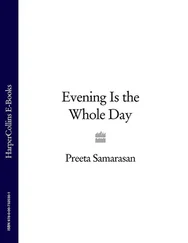She went to the city almost every day to visit Terry and always came home with good news that somehow sounded bad.
“He’s doing a little better,” she said in a distraught voice.
I soon discovered these were nothing but lies. I had been forbidden to go to the hospital because it was assumed that my weak psyche wasn’t up to a battering. But Terry was my brother, so one morning I went through all the motions of a boy preparing for school, and when the bus thundered by I hid behind a thorny bush I later burned for pricking me. Then I made my way to the asylum by hitching a ride with a refrigerator repairman who laughed snidely the whole way about people who don’t defrost.
Seeing my brother was a shock. His smile was a little too wide, his hair unkempt, his eyes vague, his skin pale. They made him wear a hospital gown so he might remember at all times that he was too unstable for a zipper or button-up fly. Only when he joked about the electricity bills for his shock therapy was I convinced that this experience wasn’t going to destroy him. We ate lunch together in a surprisingly cozy room filled with potted plants and with a large picture window that had the perfect view of a teenager with a persecution mania.
Terry turned dark in reference to the suggestion box. “What fucking tit put that there, I’d like to know,” he growled.
At the end of the visit he told me that he had not had one visit from our mother and that while he wasn’t blaming her, he thought mothers were supposed to be better than that.
When I arrived home, she was in the backyard. It had rained all afternoon, and I saw she had her shoes off and was digging her toes in the mud. She urged me to do the same because cold mud oozing through toes is a pleasure greater than anyone could imagine. She was not lying.
“Where are you going every day?” I asked.
“To visit Terry.”
“I saw him today. He said he hasn’t seen you.”
She said nothing and squelched her feet as deep in mud as they would go. I did the same. A bell rang out. We both looked up at the prison and watched it a long time, as though the sound had woven a visible path across the sky. Life up there was regulated by bells that could be heard inside every house in town. This bell signified it was time for prisoners’ afternoon exercise. There would be another bell shortly to stop it.
“You can’t tell your father.”
“Tell him what?”
“That I’ve been to the hospital.”
“Terry said you haven’t.”
“No, a regular hospital.”
“Why?”
“I think I’ve got something.”
“What?”
In the silence that followed, her eyes fell to her hands. They were white wrinkled things with blue veins the width of telephone cords. She let out a little gasp. “I have my mother’s hands!” she said suddenly with surprise and disgust, as if her mother’s hands hadn’t actually been hands but hand-shaped lumps of shit.
“Are you sick?” I asked.
“I have cancer,” she said.
When I opened my mouth, the wrong words came out. Practical words, none of the words I really wanted to say.
“Is it something they can take out with a sharp knife?” I asked.
She shook her head.
“How long have you got?”
“I don’t know.”
It was a dreadful moment that got more dreadful with every passing second. But hadn’t we had this conversation before? I felt a strange sort of déjà vu. Not the type where you feel as though you’ve already experienced an event, but the feeling that you’ve already experienced the déjà vu about the event.
“It’s going to get bad,” she said.
I didn’t say anything, and I was starting to feel as though something frosty had been injected into my bloodstream. My father shuffled out of the back door in his pajamas and stood there glumly with an empty glass in his hand. “I want a cold drink. Have you seen the ice?”
“Try the freezer,” she said, then whispered to me, “Don’t leave me alone.”
“What?”
“Don’t leave me, with him, alone.”
That’s when I did an incredible thing that to this day I still can’t get my head around.
I took my mother’s hand in mine and I said, “I swear I’ll stay with you until the day you die.”
“You swear it?”
“I swear it.”
As soon as I’d said it, this seemed like a very bad, even self-castrating idea, but when your dying mother asks you to pledge undying devotion, what are you going to say? No? Especially since I knew that her future was the exact opposite of prosperity. What would it entail? Slow periods of deterioration broken by intermittent periods of false hope and convalescence, then recontinued degeneration, all under the weight of increasing agony and the terror of approaching death, which wasn’t sneaking up silently but was coming forward from a great distance trumpets blaring.
So why did I make this pledge? It’s not that I felt pity or was overwhelmed by emotion. It’s just that I seem to have at base a revulsion to the idea of a person being left alone to suffer and die, because I myself would hate to be left alone to suffer and die, and this revulsion is so deeply embedded within me that there was nothing fine about pledging devotion to my mother, as it constituted not a moral choice but rather a moral reflex. In short, I’m a sweetheart, but I’m cold about it.
“Are you cold?” she suddenly asked me. I said no. She pointed to the goose bumps on my arm. “Let’s get you inside,” she said, and swung her arm over my shoulder as if we were old drinking buddies going inside to rack up a game of pool. As we walked up toward the house and the prison bell rang out again across the valley, I felt that either a wall had come down between us or one had been taken away, and I couldn’t work out which it was.
***
With Terry in hospital, I spent almost every afternoon with Caroline. Not surprisingly, we talked about Terry interminably. Christ, when I think of it, there hasn’t been a time in my life when I haven’t had to talk about the bastard. It’s hard to keep loving someone, even after they’re dead, when you have to keep jabbering about them.
Whenever Caroline mentioned Terry’s name, heart molecules broke off and dissolved into my bloodstream- I could feel my emotional core getting progressively smaller. Caroline’s dilemma was this: should she be the girlfriend of a crazy gangster? Of course the drama and romance of it tickled her pink, but there was a sensible voice in Caroline’s head too, one that had the effrontery to seek her happiness, and that was the voice that was getting her down. It made her miserable. I listened without interrupting. Soon enough I was able to read between the lines; Caroline had no problem envisaging Bonnie and Clyde-style escapades, but she obviously didn’t hold out much hope for Terry’s luck. He was already behind bars and he hadn’t even been arrested yet. That didn’t sit well with her plans.
“What am I going to do?” she’d cry, pacing this way and that.
I was in a pickle. I wanted her for myself. I wanted my brother’s happiness. I wanted him safe. I wanted him free of crime and danger. But most of all I wanted her for myself.
“Why don’t you write to him and give him an ultimatum?” I said with trepidation, not really knowing whose cause I was aiding. It was the first concrete suggestion I’d made, and she pounced all over it.
“What do you mean? Tell him to choose between crime and me?”
Love is powerful, I’ll admit, but so is addiction. I was wagering that Terry’s absurd addiction to crime was stronger than his love for her. It was a bitter, cynical wager I made with myself, a bet I had no probable way of winning.
Because I spent so much time at Caroline’s house, Lionel Potts became our family’s only ally. In an attempt to get Terry released from the institution, he made phone calls to various legal firms on our behalf, and when that failed, he arranged through an associate for the most renowned psychiatrist in Sydney to go have a chat with Terry. That’s the psychiatrists’ version of doing a quote: they turn up in casual pants and chat like old friends. This psychiatrist, a middle-aged man with a floppy, worn-out face, even made his way to our house to pass on his findings. We all drank tea in the living room as he told us what he’d found under Terry’s hood.
Читать дальше












